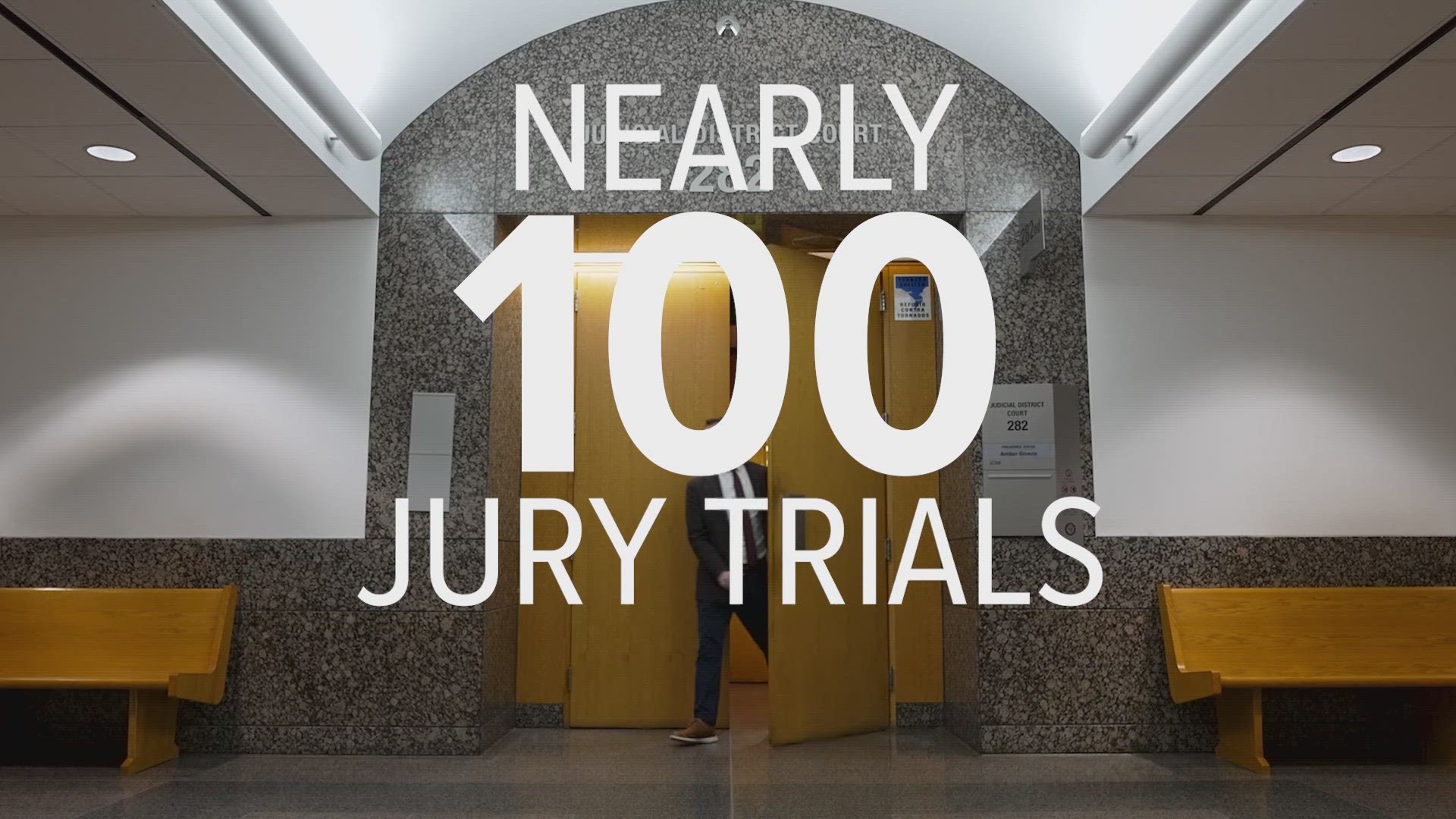DALLAS — A busy Monday does not begin to describe the schedule set for a Dallas District Court April 1, but the result was not as crowded as originally anticipated.
Dallas District Judge Amber Givens set nearly 100 jury trials for April 1 in an effort to move cases through the system fast, she said. Most ended up dismissed, delayed or otherwise disposed.
"The goal of court settings is to move cases expeditiously through the justice system to protect the rights of the victim and the accused," Givens said in a statement to WFAA Monday.
In a way, it worked.
Givens said prosecutors dismissed or agreed to plea deals in the majority of those cases. Records show most of the dispositions occurred in the final days of last week as the trial date loomed.
Other cases she agreed to delay, leaving about 10 on the docket by Monday morning. By the afternoon, only three remained, she said.
"Of the remaining three cases only two cases were ready to be tried," Givens said.
One began trial in a different courtroom, the other began jury selection in her courtroom Monday morning, she said.
"That’s why I was ready for trial," said defense attorney and former prosecutor Heath Harris, whose case was the one selected for trial in Givens' 282nd District Court.
"All I can tell you is my stats in the 282nd are good," Harris said. "I have several dismissals. I got several good deals for my clients. I’m very happy and now I’m in trial. I think it works."
But not everyone agrees on how fairly it works.
"There's some accused citizens that are probably being shortchanged and there's some victims that are probably being shortchanged," said defense attorney and former prosecutor George Milner.
He -- and others at the courthouse -- expressed concern the pressure of so many cases at once could mean defense attorneys don't have time to adequately prepare and prosecutors make deals they shouldn't.
"Where you might have said 'Hey we'll agree to a 20 year sentence,' in an effort to sell the deal they may say 'Well how about 2 years?'"
District Attorney John Creuzot told WFAA last month he had concerns the packed docket would leave attorneys on both sides of cases unprepared to meet their respective professional standards. He said most district judges rarely see double-digit jury trials set for a single day.
"I've never known this to happen," Creuzot told WFAA on March 21. But he said Givens was elected to serve that courtroom and that she could run it however she liked.
"She's entitled to set her docket how she wants," Creuzot said. "Will this be effective? Only time will tell."
For her part, Givens said she plans to keep it up.
"I am committed to and will continue addressing cases efficiently in a manner that adheres to statutory requirements and priorities," she said.
Records indicate she has 50 cases set for trial on April 15.
Previously, the Dallas Criminal Defense Lawyers Association lodged a criminal complaint against Givens for allegedly letting her court coordinator, Arceola Warfield, impersonate her and preside over a Zoom hearing in August 2021.
The Kaufman County District Attorney Erleigh Norville Wiley announced in September of last year she wouldn't bring criminal charges.
"No one at the hearing believed Judge Givens was on the call," Wiley wrote. "The evidence showed that the court reporter, and others, chided the court coordinator that they could not be 'on the record' because the judge was not on the Zoom call."
Wiley also said that Judge Givens and her defense team refused to cooperate in the investigation. In the headline of her news release, Wiley called the Dallas judge's conduct "unprofessional but not criminal."
"Having served as a judge for ten years in Kaufman County and conducting hundreds of hearings myself during that time, I believe that Judge Amber Givens should have done better that day and in the days after," Wiley wrote Friday. "There may be many reasons to censure the conduct of Judge Amber Givens, but as a prosecutor, I find there are no criminal reasons."

